Hands-On Learning Takes Root With Farm Tour
September 17, 2019
By Ann Thelen
Exploring. Learning. Understanding. We do these things every single day without realizing it. However, when exploring, learning and understanding are intentional and all come together at once, they occupy a little more space in our minds and hearts. That's exactly what happened when 40 food-minded consumers who took part in the Iowa Food & Family Project's (Iowa FFP) Expedition Farm County (EFC) in August.
The annual event, which celebrated its fifth year, takes a deep dive into modern agriculture and allows participants to interact directly with farm families across Iowa. This year’s event included a tour of dairy, soybean, corn, beef cattle and pig farms across northcentral and northwestern Iowa. Participants also enjoyed a tour and lunch at Cookies Food Products in Wall Lake and a brief stop at the stunning Grotto of the Redemption in West Bend.
“Expedition Farm Country connects farmers and consumers through hands-on learning and conversations,” says Kelly Visser, consumer engagement manager at the Iowa Soybean Association and lead organizer of Iowa FFP.
“Any question is on the table, and it’s exciting to see consumers learn more about the farm-to-table chain. Plus, they get to experience each of the producers’ dedication to growing, raising and making food.”
Participants represented a variety of industries and backgrounds including education, finance, healthcare, food banks, administrative services, communications, education and insurance. They were selected in part by their intent to share the experience with personal and professional networks.
Pork and More!
The first stop was at the Wetter Pork Farm near Rinard, where fifth-generation farmer Jonathan Wetter raises pigs, corn and soybeans. He works alongside his father to grow 2,000 acres of row crops and market 4,800 pigs each year.
In 2017, Wetter invested in building a 2,400-head, wean-to-finish pig barn. As part of his twice-daily chores, he walks through the barn to ensure pigs are healthy.
Every six weeks, weaned pigs – weighing around 8 to 12 pounds – arrive at the farm. The pigs are fed with a ration of corn, soybeans and nutrients until they reach market weight or approximately 280 to 290 pounds. The pigs are then sold to Pine Ridge Farms in Des Moines for processing into pork products.
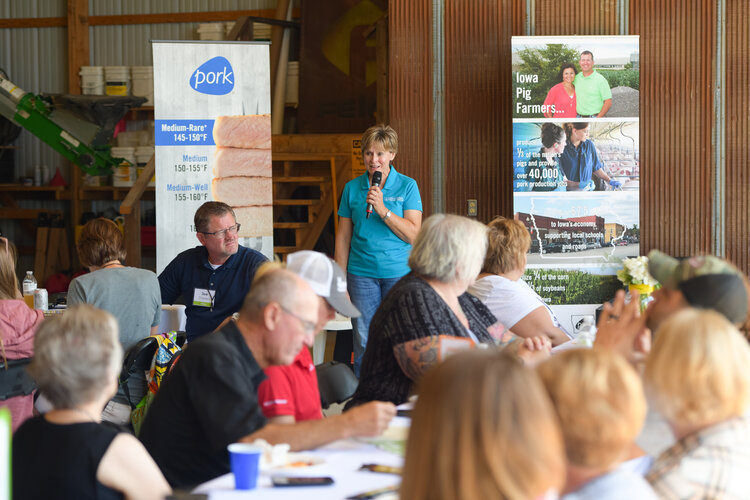
Wetter is a Production Partner farm with The Maschoffs company, meaning he provides the barn and the land, but raises the pigs for the Maschoff family. This model has several benefits for the producer, including helping a younger generation get into farming; adding revenue to the farm, with limited risk; creating a revenue and compensation stream; and using the manure to sustainably offset synthetic fertilizer costs.
“I started raising pigs to offset my farm’s fertilizer costs,” he explains. “The manure is contained in 1-million-gallon pit under the barn. An equivalent of 160 acres of manure goes onto our corn and soybean fields, which significantly reduces our fertilizer input costs.”
The Wetters are committed to ensuring their pig barn meets the highest standards in the pork industry. The modern barn uses curtains and fans to keep livestock comfortable all year long. Inside the barns, temperature controls, misters and ventilation systems synchronize 365 days a year, 24 hours a day to keep the pigs comfortable and healthy.
In addition, the Wetters are Pork Quality Assurance (PQA) certified. Introduced by the National Pork Board in 1989, PQA helps pig farmers and their employees use best practices to promote food safety.
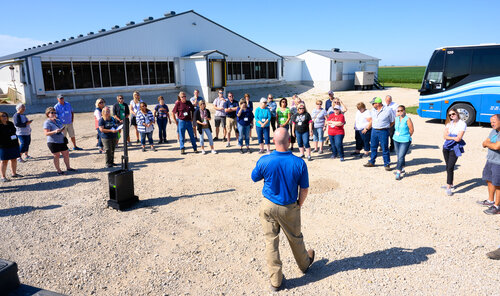
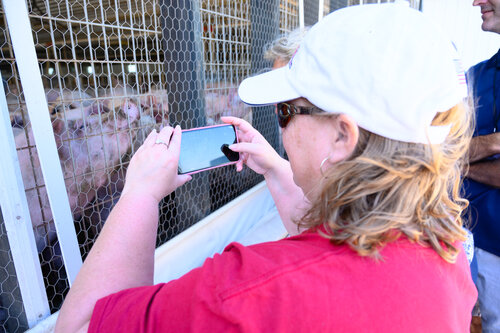
“We care about the animals we raise and the land we farm,” Wetter adds. “We have the responsibility for these natural resources, and we need to take care of them.”
Linda Gorkow, Iowa Food Bank Association director from Cedar Rapids and EFC participant saw that commitment demonstrated on the farm.
“Iowa's farmers and producers are invested in the land, connected to our state and committed to sustainability. The measure of work and advancements farmers are making as well as knowledge the farmers have about their animals is impressive,” Gorkow says.
Working Cows are Working Moms
In Spencer, EFC participants got up close with dairy cows at Jones Dairy. The family-owned and operated dairy has 1,100 milking Jersey cows, which is a breed known for its high butterfat content which is ideal for cheesemaking. Each cow produces about 7 gallons of milk per day, and the milk is sold to Agropur to make cheese.
Two of the eight Jones children work on the dairy alongside their parents, Patrick and Nancy. Daughter Aaron Titterington led portions of the EFC tour, where her contagious enthusiasm clearly displayed the family’s passion for innovation and working toward more efficient and sustainable production.
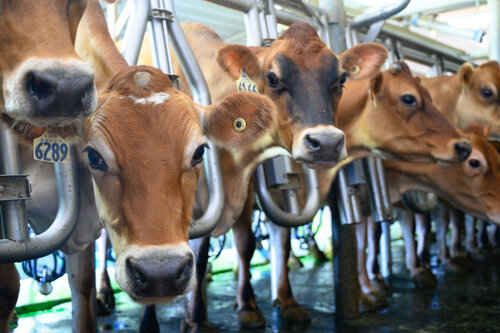
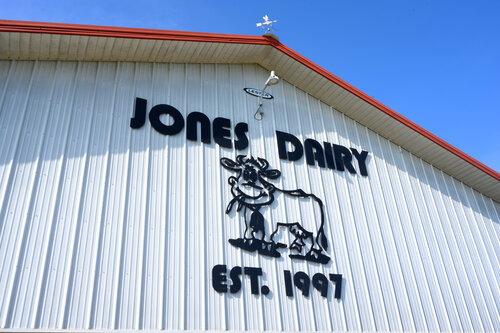
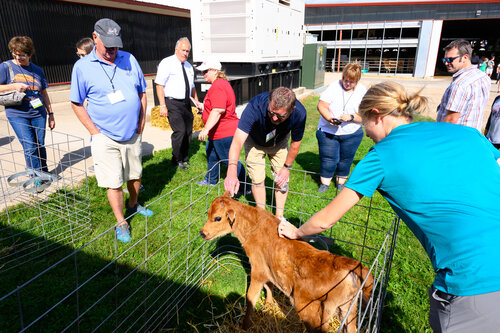
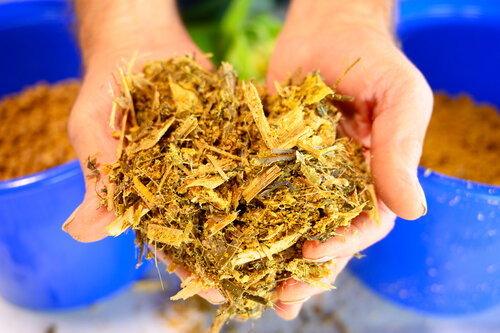
“We are always working to see how the different pieces of agriculture can fit together,” Titterington says. “Our goal is to keep making the sustainability circle bigger.”
Patrick and Nancy were the recipients of the Iowa Department of Agriculture and Land Stewardship Iowa Environmental Farm Leader Award in 2017 and the Iowa Area Development Group Iowa Venture Award in 2015.
In addition to the dairy operation, the Jones grow corn, alfalfa and winter rye. These crops are harvested and used as feed for the milking cows and growing calves.
Every day, each 1,000-pound milking cow – which Titterington fondly calls “working moms” – eats 100 pounds of feed, drinks the equivalent of a bathtub full of water and produces 65 pounds of milk and 20 gallons of manure. A nutritionist works closely with the Jones family to ensure the cows receive top-notch nutrition. A healthy and well-fed dairy cow is a happy cow, which means she’ll produce more nutritious milk.
Temperature- and air-controlled open stalls with 3-inch soft, rubber mats lining the floor provide the cows with the ideal barn amenities. Every other day, new bedding is placed in the stalls, and the manure has a variety of beneficial uses on the farm.
“Farmers are passionate about providing quality products to consumers,” says Julie Kohles, a school social worker from Johnston and EFC participant. “They work hard and have so much more refined knowledge than we all could imagine.”
Corn, Soybeans and Coffee Talk
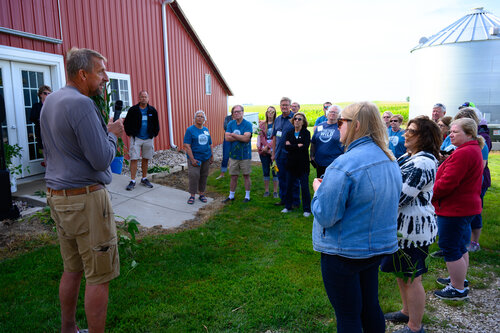
Near Auburn, Jeff and Ellen Frank raise 1,500 acres of corn and soybeans. Jeff is the fourth generation to farm on the family’s Century Farm.
Jeff is passionate about implementing cutting-edge technology on the farm. He was an early adopter of using drone technology to scout and collect data across fields and was one of the first farmers in the Midwest to test Monsanto’s FieldScripts precision planting technology.
Currently, Jeff serves on the board of directors for the Iowa Soybean Association. In this volunteer role, he is responsible for representing the needs of farmers while managing the investment farmers make in the soybean checkoff. He represents the soybean industry by participating in international trade missions, legislative sessions and frequent media interviews.
Beyond the farm, the Franks own and operate Little Green Truck Coffee Co. in Auburn. The couple opened the shop in 2017 after learning the art of roasting Arabica coffee beans. They are proud to offer freshly roasted coffee beans on a wholesale scale or in the shop, which serves as a gathering place for the community to enjoy conversation over a cup of delicious coffee.
On the farm, EFC participants enjoyed a delicious cup of the java while asking Jeff questions about topics ranging from trade, profitability and technology to environmental and weather issues.
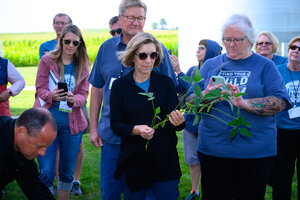
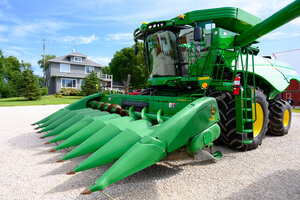

EFC participant Dorothy Pisarski, an advertising professor at Drake University from West Des Moines, checked this stop as her favorite.
“Jeff was very willing to speak to us frankly, and he was so knowledgeable,” she says. “I learned a lot about farm equipment and crops.”
She added that she was not aware of the extent technology is being used on farms today.
“It is a high-tech business and requires analytics to be successful. At the Frank Farm, I realized how visionary one needs to be to utilize advanced technology, to drive large equipment and observe data derived from drones.”
Flavor-Packed Tour
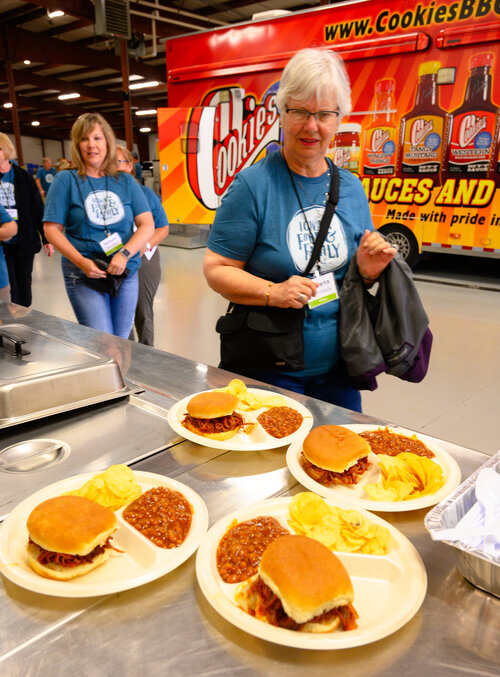
From humble beginnings, Cookies Food Products has become home to some of America’s most-loved sauces and seasonings. The company is based in Wall Lake and has been owned and operated by Duane “Speed” Herrig for more than 40 years.
Speed has a team of 17 full-time employees and produces around 6,000 gallons of sauce each day. Cookies has customers in 34 states and three countries, and products are manufactured for both retail sales and purchased by businesses for use in their food products. Expanding from the core Cookies Original Bar “B” “Q” sauce, Cookies also offers five different barbecue flavors, a wing sauce, a taco sauce, salsas and seasonings. The number one seller is the original flavored barbecue sauce followed by sweet hickory.
As a prelude to a hearty lunch of barbecued pork and all the fixings, the ever-energetic Herrig led EFF participants through a Saturday morning behind-the-scenes tour of the company’s immaculate 125,000-square-foot warehouse and production center. A subtle scent of barbecue wafted through the air whetting appetites for lunch.
“It was wonderful to see how such a famous brand is produced in a tiny Iowa town,” says Alison Mohr, a homemaker from Morning Sun and EFC participant.
The sauce and seasoning process is rigorous and with every batch produced – and before distribution – a sample is sent to a testing lab for mold, bacteria and a host of other items. In the 42-year history of the company, they haven’t had a single product recall. It’s a testament to the company’s high standards for quality.
Moo-ving Forward with the Next Generation
The last stop of the tour led to the Albright Farm where fifth-generation farmers Ben and his brother Nick work alongside their dad to feed approximately 3,000 beef cattle near Lytton. In addition to beef, the family raises corn, soybeans and hay, and have experimented with cover crops since 2012. The Albrights also own and operate a Pioneer seed business.

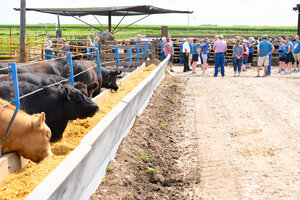
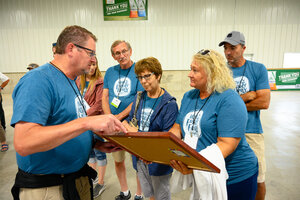
They buy cattle – mostly from Iowa and West Virginia – at 700 pounds and feed them until they reach a market weight of nearly 1,500 pounds.
“Every morning, we spend two hours doing chores – longer in the winter – including mixing feed rations and delivering water and rations to the cows,” Ben explains. “In addition, we checked each pen for the wellness of each cow and weight gain, appearance and a host of other factors to ensure their health.”
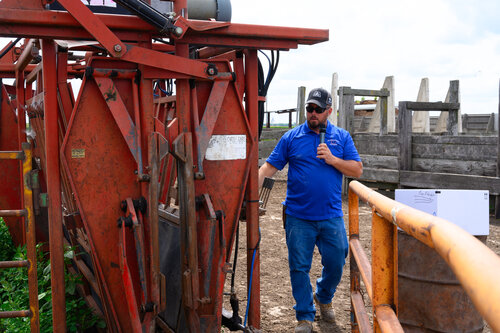
The Albrights operate a Beef Quality Assurance (BQA) certified farm, which means they meet rigorous standards for quality. Raising cattle is a demanding yet rewarding job.
Both Ben and Nick earned degrees from Iowa State University and returned to the family farm. Since returning to farm full-time in 2005, Ben has held a variety of leadership roles in the Iowa Farm Bureau, Calhoun County Farm Bureau and County Cattlemen’s Board. He has also worked as a co-operator with Practical Farmers of Iowa.
In February, Ben and his wife Susan were honored with a National Outstanding Young Farmers Award. They were selected based on their career progress, community leadership and extent of soil- and water-conservation practices.
The trip made a significant impact on participants, including Bonnie Raso, an executive assistant with EMC Insurance in Des Moines. “I’m in awe,” she says. “I can’t say enough good things about the farmers we met and how amazed I am living in my own little bubble. The hard work, dedication, time, investments and generations of their families – it’s another world for them, which impacts all of us. This experience has opened my eyes to much more than ever expected.”
Thank you to Iowa Soybean Association, Iowa Pork Producers Association, Iowa Beef Industry Council, Midwest Dairy, Iowa Corn Growers Association, Iowa Egg Council, Farm Credit Services of America, Iowa Select Farms, Key Cooperative, Latham Hi-Tech Seeds, Corteva Agriscience and Calhoun County Farm Bureau for the financial investment to make Expedition Farm Country possible. Thank you to Iowa Turkey Federation, Cookies Food Products, MercyOne and AE Dairy for in-kind support of Expedition Farm Country.
Learn more about Expedition Farm County. Applications for the 2020 trip will open in early summer next year.